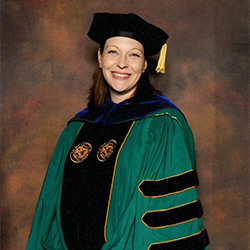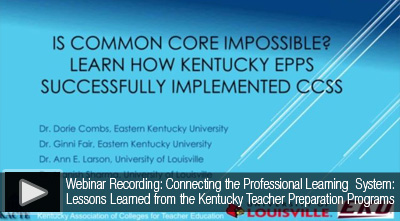14 Mar2017
By Sharon Robinson
The colleges and universities that prepare our nation’s educators are deeply committed to program quality, innovation, and accountability, and important progress is under way in each of these areas at the institutional, state, and national levels. While our priorities are unchanged by the presence or absence of federal regulations, the regulations that were voted down by Congress last week would have impeded this progress by redirecting already-tight resources to create an onerous new reporting and rating system for teacher preparation programs. Now, thanks to the robust advocacy efforts of the field, our professional commitments can proceed unhampered by burdensome mandates and prescriptive-yet-unproven methods.
Absent these regulations, educator preparation providers (EPPs) participate in numerous public reporting and quality assurance systems. Both EPPs and states are required by Title II of the Higher Education Act to submit annual reports to the U.S. Department of Education, and states must report at-risk and low-performing programs. Programs also must meet state review standards, and several states have developed data dashboards that display information for all providers to help the public compare program quality. A plurality of EPPs also undergo national examination through the Council for the Accreditation of Educator Preparation – a professional peer-review process using standards that are developed by the field and based on research.
08 Feb2017
By Sharon Robinson
Like many of you, I’ve been dismayed at the recent barrage of executive orders, controversial nominees, and heated discourse on every news feed. At the same time, the amazing display of activism and civic engagement since the inauguration has been heartening. While none of us can go to every demonstration or contact our representatives constantly, the urge to act is strong.
So what do we do? As truly significant issues of democracy are at stake, how do we choose where to direct our energies to make a meaningful difference? When such questions come to mind, I recall the voice of the 11-year-old South African boy Nkosi Johnson, who was born with HIV and became famous for his memorable address at an international conference on AIDS in 2000. This wise young man urged those assembled to get busy – even in the face of scientific unknowns and the social stigma associated with the disease that would take his life less than a year later. He said, “Do all you can with what you have, in the time that you have, in the place you are.”
24 Oct2016
By Sharon Robinson
The New York Times editorial “Help Teachers Before They Get to Class” (October 15) repeats outdated canards about teacher preparation that are as misguided as the new federal regulations celebrated in the editorial. Far from resisting higher expectations, teachers colleges are driving them.
Higher education institutions and states have raised program entry requirements in recent years, and the academic qualifications of admitted students have increased apace. By referencing an outdated and widely discredited report, the editorial misses this fact, reflected in publicly available federal datasets: today’s undergraduates preparing to be teachers have an average GPA of 3.2 on college work required for admission to the program.
19 Aug2016
By Sharon Robinson
You frequently hear AACTE champion the virtues of advocacy—of making your voice heard to help land you a place “at the table” rather than “on the menu.” AACTE staff are practiced at this habit, engaging in regular meetings with key officials at the U.S. Department of Education and elsewhere to share the work of the Association and our membership. I am pleased to share that some of these efforts have paid off with an invitation from the Department to collaborate on an upcoming teacher preparation summit.
The Department invited AACTE and the American Association of State Colleges and Universities to be partners on the summit, scheduled for November 3-4 in Washington, DC, as part of the “Teach to Lead” series focused on amplifying teachers’ voice and role in transforming education and related policy. This event will bring teams of educators together to discuss actionable ideas for collaborative, teacher-led improvements to teacher preparation. We are honored to represent you at the table on this critical issue.
16 Aug2016
By Sharon Robinson
As Americans, one of our most important duties is to participate in our democracy. Although it can be challenging to get out the vote on college campuses, engaged citizenship is one of the desired outcomes of postsecondary education, and we certainly want to nurture in our students a sense of responsibility to participate.
To help students navigate residency requirements, absentee ballots and their filing deadlines, and other voting rules and options, I encourage you to consult the resources compiled by the “Your Vote, Your Voice” campaign. This effort is spearheaded by the Washington Higher Education Secretariat, which includes AACTE and nearly 50 other national higher education organizations.
04 Aug2016
By Sharon Robinson
What did you do this summer?
For many of us in education, summer is a time for reflection on the past and planning for the future. We engage in professional learning, and if we’re lucky, we expand our horizons by visiting new places.
I had the great fortune to do all of these things last month during a fascinating trip to China.
At the invitation of China’s National Center for School Curriculum and Textbook Development, several U.S. education leaders and I participated in the China Teacher Leaders Forum and a series of other meetings with Chinese agency heads, educators and teacher educators, and business and philanthropic representatives.*
06 Jul2016
By Sharon Robinson
Last month, the Supreme Court upheld the consideration of race in admissions in its Fisher v. University of Texas at Austin decision. In our contemporary policy context of expanded civil rights—and their accompanying backlash—this ruling prompts reflection on the fundamental value of cultivating a diverse community, especially in educational settings, that includes but also extends beyond race.
Why is it important to give college students the opportunity to learn with peers from both similar and different backgrounds? For all students, having at least a “critical mass” of peers with shared characteristics boosts self-efficacy and academic success. Meanwhile, being situated in a heterogeneous learning community, particularly one that supports interaction both within and across groups, builds students’ interdependence, empathy, and fluency with “otherness.”
06 May2016
By Sharon Robinson
I had the honor of attending a half-day conference at the White House last month celebrating the Operation Educate the Educators program, a joint initiative of AACTE and the Military Child Education Coalition (MCEC) to better prepare school personnel to meet the needs of military-connected children.
The April 13 event marked not only the Month of the Military Child but also the 5-year anniversary of Joining Forces, a critical initiative launched by First Lady Michelle Obama and Second Lady Dr. Jill Biden to support military families’ health, education, and employment. Operation Educate the Educators is a key player in the education component, comprising an impressive array of programming at more than 100 AACTE member institutions and others across the country. Biden also spoke on a related panel earlier in the week at the American Educational Research Association conference.
05 Apr2016
By Sharon Robinson
It’s axiomatic that experts in a field are better equipped than outsiders to design interventions that will work. Yet in education, we face a constant barrage of external reform efforts that fail to incorporate professional knowledge and expertise—and they just don’t work.
This point is reinforced in recent research out of the National Education Policy Center. In this study, Marilyn Cochran-Smith and her colleagues at Boston College (MA) examine the evidentiary base underlying four national initiatives for teacher preparation program accountability and improvement. They find that only one of the initiatives—the beginning-teacher performance assessment edTPA, designed and managed by the profession—is founded on claims supported by research. With a measure that is valid, scoring that is reliable, and therefore results that are accurate, we have a serious tool for program improvement.
08 Mar2016
By Sharon Robinson
As performance assessment of teacher candidates becomes more widespread and as more video evidence is collected in classrooms, we have to make sure that everyone involved with these videos—and other artifacts assembled for assessment purposes—understands how they may and may not be used. I’m pleased to report that a broad base of educators, convened by AACTE to bring various stakeholders’ perspectives to the discussion, is making promising strides to help safeguard the personal information of both teacher candidates and the students in their classes.
I wrote about the importance of this topic last year (see “Safeguarding Student Data Is Everyone’s Business”), celebrating the White House’s call for heightened attention to protecting students’ digital privacy. The whole education field must engage in this campaign, and AACTE takes its role seriously. Since last fall, we have been convening an Information Privacy Task Force to develop principles regarding the secure and ethical use of classroom video and associated materials collected in performance assessments of newly prepared teachers.
05 Feb2016
By Sharon Robinson
Have you tried walking around with just one eye open? It’s tough: Your field of vision is limited; your balance suffers; you lack depth perception. Our brains need a variety of signals to bring the world into focus—and of course, this holds true not only for eyesight, but for our comprehension of just about everything.
Educator preparation is no exception. To help us meet the demands of professional practice, we form partnerships that span varying perspectives. One-dimensional views issued from the academy are as unhelpful as those emanating from the state house. But we find meaning and make progress on the tough questions when we tackle them from many angles at once, embracing complexity as an element that is essential to moving forward.
AACTE’s upcoming Annual Meeting—a convening primarily for teacher educators—will bring in these key viewpoints with significant participation from the world of practice and beyond. Beginning with preconference events and running through sessions large and small, this conference will provoke new insights on problems of practice through multidimensional views.
04 Jan2016
By Sharon Robinson
On December 10, after many painful years of wrestling with the heavy-handed No Child Left Behind Act and state waivers that were often more prescriptive than the law itself, educators finally got a new federal law governing PK-12 education. Its replacement, the Every Student Succeeds Act (ESSA), promises to return power to the states, reduce accountability burdens, and broaden the scope of support for students with the greatest needs. I join my fellow educators around the country in celebrating these improvements.
Nonetheless, there are lemons lurking among the plums in the new ESSA. This law contains more concessions to reformist entrepreneurs and venture philanthropists than many of us would like. For example, one provision in Title II allows states to create charter-like “academies” for preparing teachers and principals for high-need schools—an idea that has been debated for several years and widely opposed by education organizations. Now that it is part of the law, however, we will do well to heed Maya Angelou’s advice: if you can’t change it, change the way you think about it. So let’s celebrate the plums and then get busy making lemonade.
04 Dec2015
By Sharon Robinson

Today, USA Today published a special centerfold feature on literacy in America, accompanied by a digital campaign by Mediaplanet. I was pleased to have the opportunity to author a piece for the campaign, published as “Expanding Literacy Beyond Language Arts.” In the article I describe work that colleges of education are doing to boost literacy among America’s PK-12 students. The 275 words available in USA Today scarcely begin to tell this story, but the message is an important one to get out. Here are a few additional words I’d like to share.
Literacy has become a keystone for all other learning, particularly because of our changing expectations around assessment. Beginning with the requirements of the No Child Left Behind Act and evolving into today’s college- and career-ready standards such as the Common Core and Next Generation Science Standards, students now must show competence in all disciplines via writing, speaking, and critical thinking.
01 Dec2015
By Sharon Robinson

Wendy Bradshaw, in a photo from her Facebook profile
It’s sad but true: In October, a veteran teacher in Florida resigned because the conditions under which she was required to work did not support best practice. Despite her love of teaching and her “highly effective” ratings in evaluations, Wendy Bradshaw was trapped in an untenable position because she was required to deploy practices that were developmentally inappropriate for her young students.
Based on her extensive training in human growth and development, this highly credentialed professional with bachelor’s, master’s, and doctoral degrees would not persist in activities that she knew to be harmful to her students. “Developmentally appropriate practice is the bedrock upon which early childhood education best practices are based, and has decades of empirical support behind it,” she writes in her resignation letter. “However, the new reforms not only disregard this research, they are actively forcing teachers to engage in practices which are not only ineffective but actively harmful to child development and the learning process.”
05 Nov2015
By Sharon Robinson

As the Common Core State Standards (CCSS) and their kindred iterations continue to gain traction in schools around the country, staff development efforts have been bringing in-service educators up to speed, and colleges of education have been adjusting their curricula to ensure that the field’s newest professionals are also ready for the new standards. Nowhere has this shift seen greater success than in Kentucky, which was the first state to adopt and implement CCSS. A recent AACTE webinar sponsored by the Learning First Alliance’s “Get It Right” campaign highlighted the remarkable progress made by institutions in the state.










